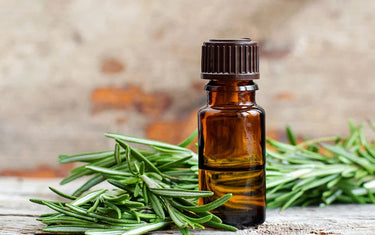9 min read / 7 September 2025 / yasmin sharp
10 Benefits and Uses of Rosemary Oil
Explore the remarkable benefits of rosemary oil and uncover its numerous practical uses and advantages.
Share this post

For anyone looking to move away from chemical-filled pills, creams and lotions to improve the condition of their skin and hair, rosemary essential oil offers some exciting possibilities.
Whilst more research is needed, research suggests that this folk medicine and culinary delight could produce some surprisingly positive results for your mind, body and overall health.
Like many other essential oils, it appears that modern society is still playing catch up when it comes to the many health properties that are packed into rosemary leaves.
Ancient societies relied heavily on the plant to treat a host of ailments, and a growing number of people are starting to discover its medicinal potential.
We want to put this to the test to see just how beneficial rosemary essential oil can be, whilst looking at its history and some practical uses you can try out at home.
What is rosemary oil?Native to the Mediterranean region, rosemary essential oil is extracted from the rosemary (Rosmarinus officinalis) shrub, an evergreen plant that is removed from the needle-like leaves via steam distillation. The plant belongs to the Lamiaceae or family of plants, which also includes lemon balm, oregano, mint, salvia and marjoram. Rosemary is a powerful source of plant compounds that can provide a host of potential health benefits. Whilst dried and fresh rosemary is frequently used in the culinary world, the oils and extracts of the plant have traditionally been relied upon for their therapeutic treatments. |
How does rosemary oil work?
Rosemary oil contains a wide variety of compounds, such as camphor, alpha-pinene and 1,8-cineole.
These help to deliver the antifungal, antibacterial, anti-inflammatory and analgesic properties that can improve circulation, breathing and digestion, to name a few.
The oil can be applied topically on the skin, infused into the air or included in soap and candle recipes, giving users multiple ways to include it as part of their daily routine.

Benefits of rosemary oil
Here are some of the most common benefits of rosemary essential oil that you can enjoy:
1. Rosemary oil for hair growth
When you search online for rosemary oil benefits you’ll quickly find that it has a strong association with hair growth.
There has been strong development in this field over the past 10-15 years, with scientists discovering compelling new evidence in every new study commissioned.
For example, a 2015 study with 50 participants used rosemary oil to treat their AGA (alopecia) on the affected areas. At the same time, another 50 participants were asked to use minoxidil.
6 months later, both groups saw a significant increase in their hair count, meaning that rosemary essential oil performed just as well as the most common and popular form of commercial hair treatment.
2. Improving liver health
The natural choleretic effects of rosemary essential oil are well known, as it helps the liver to increase the amount of bile it produces.
And because rosemary is also hepatoprotective, it can help to reduce damage to the liver. When combined, these properties further support the claim that rosemary essential oil is beneficial to liver health.
In fact, a study conducted in 2017 found that rosemary extract was able to provide liver protection benefits to rats with chemically induced liver cirrhosis.
Another study carried out in 2014 looked at how rosemary essential oil could benefit rats with induced liver injuries, and how its antioxidant properties may prove effective.
3. Boosting memory performance
A 2017 study asked participants to smell rosemary oil before undergoing several tests designed to see how well their cognitive functions performed.
The results showed that rosemary oil helped to improve their alternative and overall quality of memory.
This harks back to the days of ancient Greek scholars, who would wear rosemary to boost their memories whilst sitting exams.
Whilst much more research is needed, there have also been suggestions that rosemary essential oil could be used to improve the brain function of people with dementia, without producing any side effects.
4. Helping you to relax
Many people diffuse rosemary essential oil to enjoy the aromatherapeutic benefits it can offer. The scent can produce a calming effect for those who prefer to use natural methods to tackle feelings of stress and anxiety.
Science has backed this anecdotal evidence up to some degree. A 2017 study conducted by a team of dentists discovered that the aromatherapeutic use of rosemary oil for as little as 5 minutes reduced salivary cortisol levels in a number of participants.
This is significant because cortisol is known as the ‘stress’ hormone, which suggests that rosemary could not only help to lower stress levels, but also regulate emotions, support the immune system and help to control high blood pressure.
5. Keeping bugs and mosquitoes at bay
Whilst it may come as something of a surprise, rosemary oil can also be very effective at repelling spiders, ticks and mosquitoes.
This was tested in 2017, with a study that looked at how rosemary oil could affect mosquitoes in Argentina.
The scientists involved found that using a dilution ratio of 12.5% was enough to repel mosquitoes carrying the Zika virus with 100% protection for up to 90 minutes after application.
A similar study was conducted several years earlier in 2010, with researchers measuring the effective use of rosemary oil spray to limit the spread of lice carrying Lyme disease.

6. Working as a pain reliever
For centuries, rosemary has been used in folk medicine to provide mild pain relief. Scientists decided to put this to the test in a study involving stroke survivors with shoulder pain.
Half the participants were given rosemary oil for 20 minutes twice daily, whilst the other half received only acupressure treatment. The people who received rosemary saw a 30% reduction in pain, whilst the other half of the group saw a 15% reduction in pain.
Another study, this time using animals, found that rosemary oil was slightly more effective than acetaminophen, which is a popular over-the-counter medication.
7. Easing circulation concerns
A lot of people suffer with bad circulation, be it in their hands, toes or with more serious heart-related conditions.
One study involved a woman with Raynaud’s disease – a condition that restricts circulation.
When she rubbed her hands with a rosemary oil blend, she found that it warmed her fingertips more than a neutral oil. Thermal imaging was then used to confirm these findings.
Another study looked at how using rosemary essential oil could help to expand your blood vessels, thus allowing blood to flow more freely around the body.
8. Reducing joint inflammation
Early evidence suggests that you may be able to reduce joint inflammation that leads to swelling, stiffness and pain by using rosemary oil.
This may occur because the oil is able to stem the movement of white blood cells to injured tissues, helping to release key inflammatory chemicals.
A study involving people with rheumatoid arthritis saw them given a rosemary oil blend to massage into their knee for a 15-minute period, three times a week.
By the end of the study, 50% saw an decrease in inflammatory knee pain, whilst those that did not receive the oil only saw a 12% decrease.
9. Giving you a pick-me-up
Sometimes we all need a little something to give us a boost, and similar to how rosemary essential oil can help to ease stress and anxiety, it can also be used to perk you up.
20 young students were involved in a study that required them to inhale rosemary oil. Compared to smelling a placebo oil, 30% reported they felt more refreshed mentally and 25% less drowsy.
In another study, 35 healthy people were asked to apply diluted rosemary essential oil to their skin. They said it made them feel more energetic, alert and attentive 20 minutes after application compared to using a placebo oil.
10. Multiple ways to use it
One of the best rosemary oil benefits is its ease of use. You can inhale the essential oil by adding a few drops to a handkerchief or tissue and inhaling.
Or you can inhale directly from the bottle. Alternatively, you can dilute rosemary oil with a carrier oil and apply to the skin.
Many people also diffuse rosemary oil at home with an oil burner or electric diffuser, filling the space with a relaxing and calming aroma.
Other options include diluting the oil with a carrier oil and adding to a warm bath to let the health benefits soak in or using rosemary as part of a soap or candle recipe.

How to use rosemary oil
Some common uses of rosemary oil include:
As a massage oil
To enjoy the benefits of rosemary essential oil as a massage oil, simply add 5 drops to 10ml of carrier oil (coconut or jojoba oil, for example) and then massage evenly into the skin. To target the liver area or to ease pain and discomfort, rub into the target area using soft, gentle motions.
As skin and hair care lotion
Add a couple of drops of rosemary oil to a carrier oil or your preferred face wash, toner or lotion, and rub lightly into the palm of your hand. For haircare, apply evenly to your hair and leave for 25-30 minutes before washing out as normal. Following the same approach for skincare, although you do not need to wash it off.
History of rosemary oil
The original name given to the rosemary plant is Rosmarinus officinalis, which is derived from the Latin words “ros” and “marinus” which means “dew of the sea”.
Rosemary oil was once considered sacred by ancient Hebrews, Greeks, Egyptians and Romans due to the many health benefits it possesses.
Some communities even burned the herb as a way to ward off evil spirits and to encourage good health amongst family and friends (especially during the bubonic plague).
Today it continues to be used for both culinary and medicinal purposes, proving to be equally as useful adding flavour to a food recipe, as it is providing anti-inflammatory, antioxidant and antimicrobial benefits.

Rosemary oil FAQs
How much rosemary how should I use?
If you are diffusing rosemary oil, you should use around 3-5 drops. For topical application, make sure it is correctly diluted with a carrier oil (1-2 drops per teaspoon) to prevent irritation. To add it to a bath, dilute 6-8 drops with your carrier oil of choice.
Does rosemary oil really work for hair growth?
Research is ongoing into rosemary oil benefits for hair, although the early signs are promising. As we mentioned in the benefits section above, some studies have produced some positive results.
Providing you do not have an allergy to rosemary oil, trying it on your hair and scalp could improve their condition and overall health.
What are the side effects of rosemary oil?
Rosemary oil is usually safe for most people to use on their skin. However, even when diluted correctly there is a small possibility it could cause an allergic reaction or irritation. If you are a first-time user, it’s a good idea to complete a patch test to ensure it is compatible with your skin.
|
Product Name |
100% Pure Rosemary Essential Oil |
| Botanical Name | Rosemarinus Officinalis L. |
| Scent Type | Herbs |
| Benefits & Uses | Enhances Focus, Hair Care, Relaxing |
| Suitable for Diffusers? | Yes, this rosemary essential oil is perfect for diffusers. |
| Suitable for Candles and Soaps? | Yes, this rosemary essential oil is perfect for candle and soap making. |
| Extraction Method | Steam Distillation |
| Bottle Type | Tamper proof and UV resistant |









